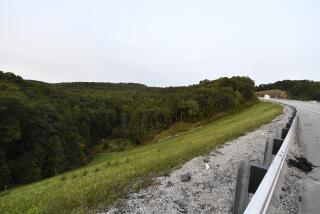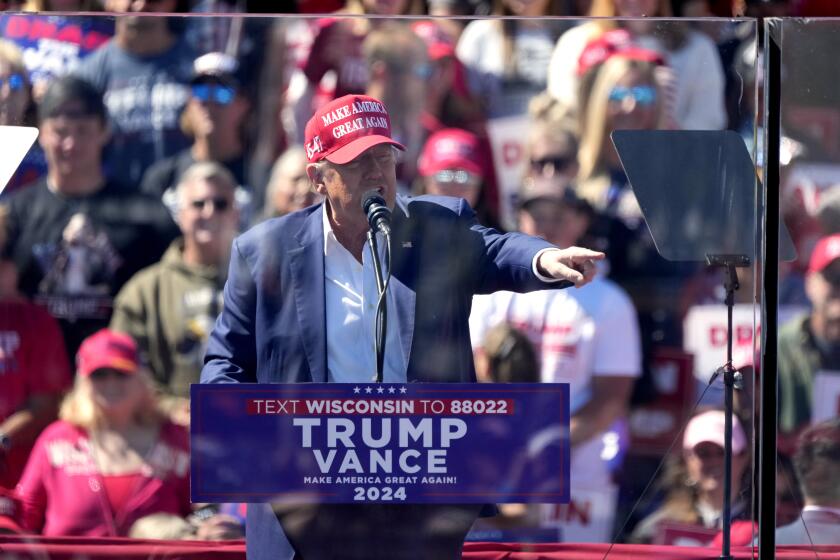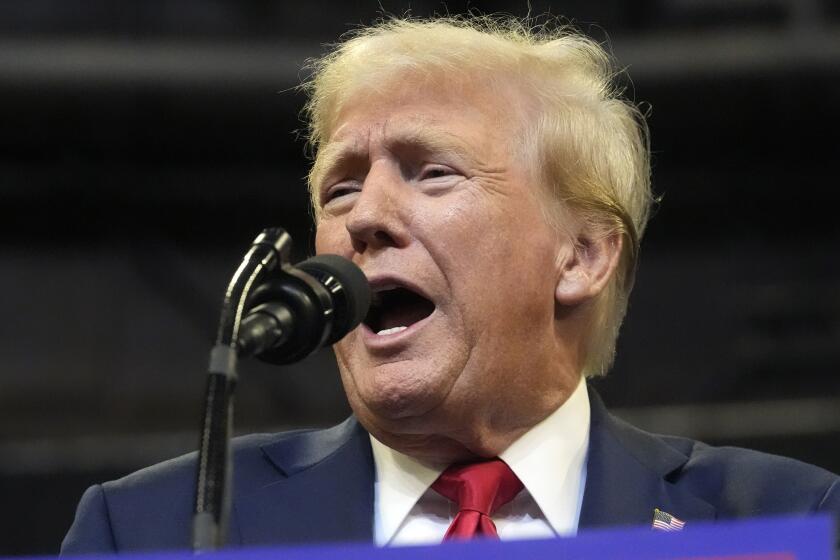Old rivals unite in new Nicaragua
If you want to be a friend of Daniel Ortega, the once and perhaps future president of Nicaragua, it helps if you were once his enemy. An intimidating nom de guerre doesn’t hurt either.
“The Godfather,” “Commander Bull’s-Eye” and “the Alligator” -- to a man, they either fought in or backed the Contra war that sought to overthrow Ortega’s revolutionary Sandinista government in the 1980s. Now all three are working to get him elected president, 16 years after Nicaraguans voted the mustachioed hero of the Latin American left out of office.
“In the battle between realism and idealism, realism has won out,” Jaime “the Godfather” Morales Carazo said, explaining why he and so many other Nicaraguan conservatives have joined the Sandinista camp. “If you think about the future, you can’t look back at the past.”
Once the Contras’ top political negotiator, Morales lost his palatial home in Managua, the capital, when the Sandinistas expropriated it and handed it over to Ortega, who still lives there. Now Morales is Ortega’s running mate in the Nov. 5 presidential election.
Across Nicaragua, pictures of the graying Morales occupy billboards alongside portraits of Ortega, himself an avuncular 60-year-old with thinning black hair who bears a diminishing resemblance to the youthful rebel he once was. The Ortega-Morales ticket leads in all the preelection polls: A Zogby survey last week had Ortega 15 percentage points ahead of his nearest rival.
The Cold War enmities that once defined politics here are a fading memory. No one worries much any more about communism or a Reaganesque counterrevolution. Instead, people wonder what Ortega really stands for, and if there’s anyone he won’t make a deal with.
“Ortega has turned his movement into a buffet lunch and everyone is invited: conservatives and radicals, Sandinistas and anti-Sandinistas, pro-Americans and anti-Americans,” said Emilio Alvarez Montalvan, a conservative former foreign minister. “The essential question people are asking themselves is if Daniel Ortega has really changed.”
Most observers here agree that an economic crisis that has forced thousands of Nicaraguans to emigrate is feeding Ortega’s lead in the polls. On the campaign trail, he has portrayed himself as the antidote to the conservative economic ideas backed by the country’s last three presidents.
“We’ve had 16 years of these democratic governments, and what have they given us?” Ortega asked a rally in Leon, a city 50 miles northwest of Managua. “They’ve turned us into beggars! They’ve plundered the people and robbed from our youth.”
Unemployment stands at about 17%, and since 1990 half a million Nicaraguans have left the country in search of work in the United States and nearby countries such as El Salvador and Costa Rica.
“Before, we could blame the war for keeping us in poverty,” said Marcelina Castillo, a professor of education at Managua’s Central American University. “What’s the excuse now? There isn’t a war and we can’t blame Daniel. Maybe we have to give him another chance.”
The Sandinistas ruled Nicaragua after leading the 1979 revolution that toppled dictator Anastasio Somoza. In 1990, Ortega lost in a stunning electoral upset to conservative Violeta Chamorro. Then he lost two more presidential elections, in 1996 and 2001. Memories of the economic crises of Ortega’s wartime government and the military draft the Sandinistas imposed, along with accusations of sexual abuse leveled against Ortega by his stepdaughter in 1998, ate away at his popularity.
“Ortega is the weakest element of the Sandinista movement,” said Oscar Rene Vargas, a Nicaraguan political analyst. “He doesn’t have much personal credibility. His strength is that he has consolidated the Sandinistas’ core support and kept it going, even though the Americans thought it would disappear.”
Ortega has also broadened his base. These days, the party’s commercials feature old Contras declaring their support for Ortega. “Reconciliation ... peace, work and well-being” is the new party slogan. Ortega has apologized to the Roman Catholic Church for the Sandinistas’ treatment of religious groups during the war and has made peace with another of his most strident enemies: Roman Catholic Cardinal Miguel Obando y Bravo.
Last year, Obando y Bravo presided over Ortega’s Catholic wedding ceremony to longtime companion Rosario Murillo. And the Sandinistas, once known as pioneers of Latin American feminism, have come out firmly against any loosening of the country’s strict anti-abortion laws.
But to a large segment of Nicaragua, Ortega remains anathema -- and not just because of the Sandinistas’ conduct during the Contra war, which saw runaway inflation and a crackdown on the opposition press. After losing the 1990 election, Ortega and his allies used their last weeks in office to take personal possession of property expropriated by the government, a process known here as “the pinata.”
Over the last few years, the Sandinista National Liberation Front has reached a series of agreements with the Constitutional Liberal Party of Arnoldo Aleman, the disgraced right-wing former president.
Many Nicaraguans speak of the Sandinista-conservative alliance in ominous tones, calling it El Pacto, the pact. Under the alliance, Aleman and Ortega were granted lifetime appointments to the National Assembly and thus immunity from any prosecution.
El Pacto also led to a constitutional amendment that lowered the threshold for a first-round victory in the presidential election to 35%, a move that many analysts here say was designed to ease a Sandinista victory.
“The government is controlled by the decisions of these two caudillos, Ortega and Aleman,” said Carlos Tunnermann, Nicaragua’s former ambassador to the United States. “And Ortega has the advantage of possessing the keys to Aleman’s jail cell ... since he controls the judges and can send Aleman to prison whenever he wants.”
Aleman was sentenced in 2003 to 20 years in prison for fraud and money-laundering, but last year he was freed from house arrest on condition that he remain in Managua.
For months, U.S. Ambassador to Nicaragua Paul Trivelli and the State Department have worked publicly and privately to derail Ortega’s campaign. Trivelli tried without success to unite the anti-Ortega opposition behind a single candidate. And U.S. officials have warned Nicaraguans of dire consequences for their democracy should Ortega be elected.
For his part, Ortega almost never mentions the U.S. or the Bush administration on the campaign trail, observers say.
Instead, he directs his attacks at the conservative politicians who have run Nicaragua for the last 16 years. Their free-market reforms, he says, have put the interests of the rich ahead of the needs of the poor.
“His holiness [the late Pope] John Paul II called it ‘savage capitalism,’ ” Ortega told the rally in Leon. “His holiness said, ‘The poor can’t wait.’ And the poor will not wait. On Nov. 5, the poor are going to bury ‘savage capitalism’ once and for all in Nicaragua.”
*
More to Read
Sign up for Essential California
The most important California stories and recommendations in your inbox every morning.
You may occasionally receive promotional content from the Los Angeles Times.











